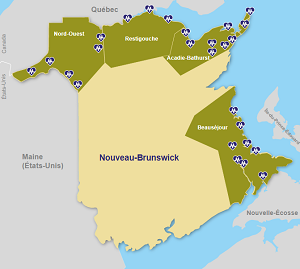National Indigenous Peoples Day

Bathurst, Thursday, June 21, 2018 – For National Indigenous Peoples Day, Vitalité Health Network would like to emphasize its partnership with the First Nations it serves.
“On behalf of the Network’s staff and Leadership Team, I am happy to stress the importance of the privileged relationships that we have with the Indigenous communities in the province. This partnership is at the root of our commitment to collaborate to the wellness and the improved health of the Indigenous population by providing them with services that are better adapted to their culture, heritage and language,” stated Gilles Lanteigne, President and CEO of Vitalité Health Network.
Several initiatives have been implemented thanks to a long-standing collaborative work with First Nations. It is thanks to the commitment of the staff that we have been able to cultivate and establish respectful relationships with the Mi'kmaq and Malecite communities in New Brunswick.
Five projects benefiting Indigenous communities in New Brunswick were implemented:
-
The New Brunswick Fetal Alcohol Spectrum Disorder (FASD) Centre of Excellence has developed and launched a unique model called “Dreamcatcher”, which ensures a culturally appropriate delivery of services to First Nations clients and families while supporting their safety and well-being. The model was accepted as a best practice by the province’s 15 Indigenous communities.

NB Fetal Alcohol Spectrum Disorder Centre of Excellence recipient of the Creativity and Innovation Award for developing ‘’Dreamcatcher’’,
a unique frontline health service delivery model (health determinants unique to First Nations).
- In July 2018, the FASD Centre of Excellence will provide, under Jordan’s Principle, a traditional camp on the fetal alcohol spectrum disorder (FASD) for First Nations and their families. There will be more than 60 people, families and children united in one place for a unique experience. The camp will enable them to get a better understanding of FASD, and participants will learn in an atmosphere that is consistent with their culture.
- The fitting-out, in December 2017, of the First Nation Family Room at Addictions Services in Campbellton. The room is used to improve services provided to First Nation clients and families from the Campbellton area and surrounding communities. This project was made possible thanks to the collaboration of the Eel River Bar and Listuguj First Nations.
- The hiring of a First Nations Regional Access Coordinator. As part of her duties, this representative oversees the coordination and effectiveness of steps taken to improve access to mental health and addiction services as well as primary care for First Nations.
- The project called "Braiding First Nations' Culture" is intended to enhance the cultural competencies of all our employees and build ties with First Nations' communities across the province. A learning plan was developed to allow Network employees to acquire skills, knowledge and an openness toward improving cultural competencies.
“We take pride in the close relationships we have established with the First Nations, which enable us to better understand their cultural diversity and to better recognize their health care needs. The confidence and respect they have for our organization is the result of a long-standing process,” he added.

Gloria Sock, First Nations Liaison Officer, with a patient at Stella-Maris-de-Kent Hospital.

